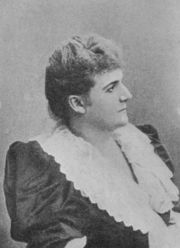
Augusta Holmès
Encyclopedia

France
The French Republic , The French Republic , The French Republic , (commonly known as France , is a unitary semi-presidential republic in Western Europe with several overseas territories and islands located on other continents and in the Indian, Pacific, and Atlantic oceans. Metropolitan France...
composer
Composer
A composer is a person who creates music, either by musical notation or oral tradition, for interpretation and performance, or through direct manipulation of sonic material through electronic media...
of Irish
Ireland
Ireland is an island to the northwest of continental Europe. It is the third-largest island in Europe and the twentieth-largest island on Earth...
descent. At first she published under the pseudonym
Pseudonym
A pseudonym is a name that a person assumes for a particular purpose and that differs from his or her original orthonym...
Hermann Zenta. In 1871, Holmès became a French citizen and added the accent to her last name. She herself wrote the lyrics to almost all her songs and oratorios, as well as the libretto of the opera La Montagne Noire.
Biography
Holmès was born in ParisParis
Paris is the capital and largest city in France, situated on the river Seine, in northern France, at the heart of the Île-de-France region...
. Despite showing talent at the piano, she was not allowed to study at the Paris Conservatoire, but she took lessons privately. She developed her piano playing under the tutelage of local pianist Mademoiselle Peyronnet, Versailles' cathedral organist Henri Lambert, and Hyacinthe Klosé
Hyacinthe Klosé
Hyacinthe Eléonore Klosé was a French clarinet player, professor at the Conservatoire de Paris, and composer....
. Also, she showed some of her earlier compositions to Franz Liszt
Franz Liszt
Franz Liszt ; ), was a 19th-century Hungarian composer, pianist, conductor, and teacher.Liszt became renowned in Europe during the nineteenth century for his virtuosic skill as a pianist. He was said by his contemporaries to have been the most technically advanced pianist of his age...
. Around 1876, she became a pupil of César Franck
César Franck
César-Auguste-Jean-Guillaume-Hubert Franck was a composer, pianist, organist, and music teacher who worked in Paris during his adult life....
, whom she considered her real master. (She led the group of Franck's students who in 1891 commissioned for Franck's tomb a bronze medallion from Auguste Rodin
Auguste Rodin
François-Auguste-René Rodin , known as Auguste Rodin , was a French sculptor. Although Rodin is generally considered the progenitor of modern sculpture, he did not set out to rebel against the past...
.)
Camille Saint-Saëns
Camille Saint-Saëns
Charles-Camille Saint-Saëns was a French Late-Romantic composer, organist, conductor, and pianist. He is known especially for The Carnival of the Animals, Danse macabre, Samson and Delilah, Piano Concerto No. 2, Cello Concerto No. 1, Havanaise, Introduction and Rondo Capriccioso, and his Symphony...
wrote of Holmès in the journal Harmonie et Mélodie, "Like children, women have no idea of obstacles, and their willpower breaks all barriers. Mademoiselle Holmès is a woman, an extremist."
Holmès never married, but she cohabited with the poet Catulle Mendès
Catulle Mendès
Catulle Mendès was a French poet and man of letters.Of Portuguese Jewish extraction, he was born in Bordeaux. He early established himself in Paris and promptly attained notoriety by the publication in the Revue fantaisiste of his Roman d'une nuit, for which he was condemned to a month's...
, to whom she bore five children.
For the 1889 celebration of the centennial of the French Revolution
French Revolution
The French Revolution , sometimes distinguished as the 'Great French Revolution' , was a period of radical social and political upheaval in France and Europe. The absolute monarchy that had ruled France for centuries collapsed in three years...
, Holmès was commissioned to write the Ode Triomphale for the Exposition Universelle, a work requiring about 1200 musicians. She gained a reputation of being a composer of programme music with political meaning, such as her symphonic poems Irlande and Pologne.
Holmès bequeathed most of her musical manuscripts to the Paris Conservatoire.
Selected compositions
Operas
- Héro et Leandre (1874) opera in one act
- Astarté, opera (unpublished)
- Lancelot du lac, opera in one act (unpublished)
- La Montagne noir, opera in four acts (1895), f.p. Paris Opéra, 8 Feb 1895
Vocal works
- Parmi les meules, for voice and piano
- Triumphal Ode, for a chorus of 900 and an orchestra of 300
- Vision de Saint Thérèse, voice and orchestra
- Hymne à la paix, cantata
- Au pays bleu
- Hymne à Apollo, choral
- La Vision de la reine, cantata
Orchestral works
- Andromede, symphonic poem
- Irlande, symphonic poem
- La Nuit et l'amour: Interlude de l'ode symphonique - Ludus pro Patria, symphonic poem
- Lutèce, symphony
- Ouverture pour une comédie, symphonic poem
- Pologne, symphonic poem
- Trois anges sont Venus ce soir

